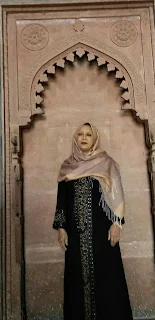In many Western nations
with Muslim minorities these days, prejudice and suspicion against the
religious beliefs and cultural traditions of the Muslims are openly out on
display. The 'Hijab' (-a form of dress covering the head and the entire body
worn by Muslim women, in its various manifestations in diverse cultural
traditions- burqa, niqab, chador, abaya,
etc.) – has been made into a volatile political issue,
with many in host societies dubbing the veil to represent Muslim women in
stereotypical terms.
Islamic teachings on social etiquette and dressing promote decency and propriety, recognizing the need for modesty, privacy and dignity of individuals, especially women. The Islamic rules on lowering of gaze by both men and women, concealing nakedness and not sexualizing one’s appearance, etc. seek to achieve modesty and public chastity. The Qur’anic guidance on ‘Hijab’ can thus be seen as a significant part of a profound framework on ‘garment of piety/raiment of righteousness’ for all believers, men and women (7:27).
The teachings on ‘Hijab’ seek to liberate women from the male gaze while allowing them to remain socially engaged as active participants with integrity, agency and God consciousness. In our unfortunate era where male weakness and proclivity for sexual lasciviousness is actively promoted through commodification of culture and the consequent objectification of women’s bodies, ‘Hijab’ stands for the anti-thesis of the consumer capitalism and atheistic materialism on offer, pointing to the stark contrast between competing visions of ‘freedom’ in Islam and the 'post-truth' societies.
Extracted below is a Speech delivered by Hazrat Ummul Mu’mineen Fazli Amena Varsally (International Sadr Saheba-Siraj Makin) on the value of Hijab, delivered at the Siraj Makin Conference in Mauritius in August 2016. Referring to the ongoing, manufactured controversy over the right of Muslim women to wear what they want, Hazrat Saheba points out that the Islamic dressing norms are rooted in modesty and chastity, and that the ethical framework is shared by all religions of the past. The irony of Christian nations ignoring and insulting the dressing choice of Virgin Mary is highlighted. Hazrat Ummul Mu'mineen calls our attention to a latent challenge that lies hidden behind the controversies surrounding the right to wear Hijab in our times: the very identity of Muslim women is under threat of being reconfigured in the western conceptions of freedom and women’s rights. She argues that it is ultimately for Muslim women themselves to assert their human right to fundamental freedoms of choice in dressing up in Hijab so as to profess and practice and propagate the beliefs and convictions they deeply care for.
Read the Speech below:
Islamic teachings on social etiquette and dressing promote decency and propriety, recognizing the need for modesty, privacy and dignity of individuals, especially women. The Islamic rules on lowering of gaze by both men and women, concealing nakedness and not sexualizing one’s appearance, etc. seek to achieve modesty and public chastity. The Qur’anic guidance on ‘Hijab’ can thus be seen as a significant part of a profound framework on ‘garment of piety/raiment of righteousness’ for all believers, men and women (7:27).
The teachings on ‘Hijab’ seek to liberate women from the male gaze while allowing them to remain socially engaged as active participants with integrity, agency and God consciousness. In our unfortunate era where male weakness and proclivity for sexual lasciviousness is actively promoted through commodification of culture and the consequent objectification of women’s bodies, ‘Hijab’ stands for the anti-thesis of the consumer capitalism and atheistic materialism on offer, pointing to the stark contrast between competing visions of ‘freedom’ in Islam and the 'post-truth' societies.
Extracted below is a Speech delivered by Hazrat Ummul Mu’mineen Fazli Amena Varsally (International Sadr Saheba-Siraj Makin) on the value of Hijab, delivered at the Siraj Makin Conference in Mauritius in August 2016. Referring to the ongoing, manufactured controversy over the right of Muslim women to wear what they want, Hazrat Saheba points out that the Islamic dressing norms are rooted in modesty and chastity, and that the ethical framework is shared by all religions of the past. The irony of Christian nations ignoring and insulting the dressing choice of Virgin Mary is highlighted. Hazrat Ummul Mu'mineen calls our attention to a latent challenge that lies hidden behind the controversies surrounding the right to wear Hijab in our times: the very identity of Muslim women is under threat of being reconfigured in the western conceptions of freedom and women’s rights. She argues that it is ultimately for Muslim women themselves to assert their human right to fundamental freedoms of choice in dressing up in Hijab so as to profess and practice and propagate the beliefs and convictions they deeply care for.
Read the Speech below:
'Hijab' in a milieu of anti-Muslim prejudices
Today, we see that the Hijab (veil) of the Muslim woman has
become a menace for people who view Islam as a religion of terrorism.

